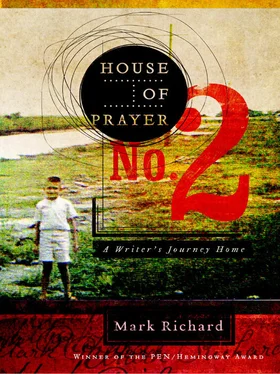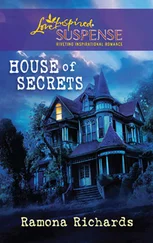

And Jacob awaked out of his sleep, and he said,
Surely the LORD is in this place; and I knew it not.
—GENESIS 28 : 16

SAY YOU HAVE A “SPECIAL CHILD,” which in the South means one between Down’s and dyslexic. Birth him with his father away on Army maneuvers along East Texas bayous. Give him his only visitor in the military hospital his father’s father, a sometime railroad man, sometime hired gun for Huey Long with a Louisiana Special Police badge. Take the infant to Manhattan, Kansas, in winter, where the only visitor is a Chinese peeping tom, little yellow face in the windows during the cold nights. Further frighten the mother, age twenty, with the child’s convulsions. There’s something “different” about this child, the doctors say.
Move the family to Kirbyville, Texas, where the father cruises timber in the big woods. Fill the back porch with things the father brings home: raccoons, lost bird dogs, stacks of saws, and machetes. Give the child a sandbox to play in, in which scorpions build nests. Let the mother cut the grass and run over rattlesnakes, shredding them all over the yard. Make the mother cry and miss her mother. Isolate her from the neighbors because she is poor and Catholic. For playmates, give the child a mongoloid girl who adores him. She is the society doctor’s child and is scared of thunder. When it storms, she hides, and only the special child can find her. The doctor’s wife comes to the house in desperation. Please help me find my daughter. Here she is, in the culvert, behind a bookcase, in a neighbor’s paper tepee. Please come to a party, the doctor’s wife sniffs, hugging her daughter. At the party, it goes well for the nervous mother and the forester father until their son bites the arm of a guest and the guest goes to the hospital for stitches and a tetanus shot. The special child can give no reason why.
Move the family to a tobacco county in Southside Virginia. It is the early sixties, and black families still get around on mule and wagon. Corn grows up to the backs of houses even in town. Crosses burn in yards of black families and Catholics. Crew cut the special child’s hair in the barbershop where all the talk is of niggers and nigger-lovers. Give the child the responsibility of another playmate, the neighbor two houses down, Dr. Jim. When Dr. Jim was the child’s age, Lee left his army at Appomattox. When Dr. Jim falls down between the corn rows he is always hoeing, the child must run for help. Sometimes the child just squats beside Dr. Jim sprawled in the corn and listens to Dr. Jim talking to the sun. Sometimes in the orange and grey dusk when the world is empty, the child lies in the cold backyard grass and watches the thousands of starlings swarm Dr. Jim’s chimneys, and the child feels like he is dying in an empty world.
The child is five years old.
Downstairs in the house the family shares is a rough redneck, a good man who brought a war bride home from Italy. The war bride thought the man was American royalty because his name was Prince. Prince was just the man’s name. The Italian war bride is beautiful and has borne two daughters, the younger is the special child’s age. The elder is a teenager who will soon die of a blood disease. The beautiful Italian wife and the special child’s mother smoke Salems and drink Pepsi and cry together on the back steps. They both miss their mothers. In the evening Prince comes home from selling Pontiacs, and the forester father comes home from the forest, and they drink beer together and wonder about their wives. They take turns mowing the grass around the house.
The company the father works for is clearing the land of trees. The father finds himself clearing the forests off the old battlefields from the Civil War. The earthworks are still there, stuff is still just lying around. He comes home with his pockets full of minié balls. He buys a mine detector from an Army surplus store, and the family spends weekends way deep in the woods. One whole Sunday the father and the mother spend the day digging and digging, finally unearthing a cannon-sized piece of iron agate. The mother stays home after that. On Sunday nights she calls her mother in Louisiana and begs to come home. No, her mother says. You stay. She says this in Cajun French.

THE LITTLE GIRL DOWNSTAIRS is named Debbie. The special child and Debbie play under the big pecan tree where the corn crowds the yard. One day the special child makes nooses and hangs all of Debbie’s dolls from the lower limbs of the tree. Debbie runs crying inside. Estelle, the big black maid, shouts from the back door at the special child to cut the baby dolls down, but she doesn’t come out in the yard to make him do this and he does not. She is frightened of the special child, and he knows this. If he concentrates hard enough, he can make it rain knives on people’s heads.
Maybe it would be best if something were done with the special child. The mother and father send him to kindergarten across town, where the good folk live. The father has saved his money and has bought a lot to build a house there, across from the General Electric Appliance dealer. Because he spent all his money on the lot, the father has to clear the land himself. He borrows a bulldozer from the timber company and “borrows” some dynamite. One Saturday he accidentally sets the bulldozer on fire. One Sunday he uses too much dynamite to clear a stump and cracks the foundation of the General Electric Appliance dealer’s house. The father decides not to build in that neighborhood after all.
In the kindergarten in that part of town there are records the teacher whom the special child calls Miss Perk lets him play over and over. When the other kids lie on rugs for their naps, she lets him look at her books. During reading hour he sits so close to her that she has to wrap him in her arms while she holds the book. The best stories are the ones Miss Perk tells the class herself. About the little girl whose family was murdered on a boat and the criminals tried to sink the boat. The little girl saw water coming in the portholes, but she thought the criminals were just mopping the decks and doing a sloppy job. Miss Perk told about the car wreck she saw that was so bloody she dropped a pen on the floor of her car for her son to fetch so he wouldn’t have to see the man with the top of his head ripped off like he had been scalped. On Fridays is Show-and-Tell, and the special child always brings the same thing in for Show-and-Tell, his cat Mr. Priss. Mr. Priss is a huge, mean tomcat that kills other cats and only lets the special child near him. The special child dresses Mr. Priss in Debbie’s baby doll clothes, especially a yellow raincoat and yellow sou’wester-style rain hat. Then the special child carries Mr. Priss around for hours in a small suitcase. When his mother asks if he has the cat in the suitcase again, the special child always says, No, ma’am .
Miss Perk says the way the other children follow the special child around, that the special child will be something someday, but she doesn’t say what.
The father and the mother meet some new people. There is a new barber and his wife. The new barber plays the guitar in the kitchen and sings Smoke! Smoke! Smoke that cigarette! He is handsome and wears so much oil in his hair that it stains the sofa when he throws back his head to laugh. He likes to laugh a lot. His wife teaches the mother how to dance, how to do the Twist. There is another new couple in town, a local boy, sort of a black sheep, from country folk, who went away to Southeast Asia to be a flight surgeon and is back with his second or third wife, nobody knows for sure. At the reckless doctor’s apartment, they drink beer and do the Twist and listen to Smothers Brothers albums. They burn candles stuck in Chianti bottles. The special child is always along because there is no money for a babysitter and Estelle will not babysit the special child. One night the special child pulls down a book off the doctor’s shelf and begins to slowly read aloud from it. The party stops. It is a college book about chemicals. In two more months the child will start first grade.
Читать дальше
















